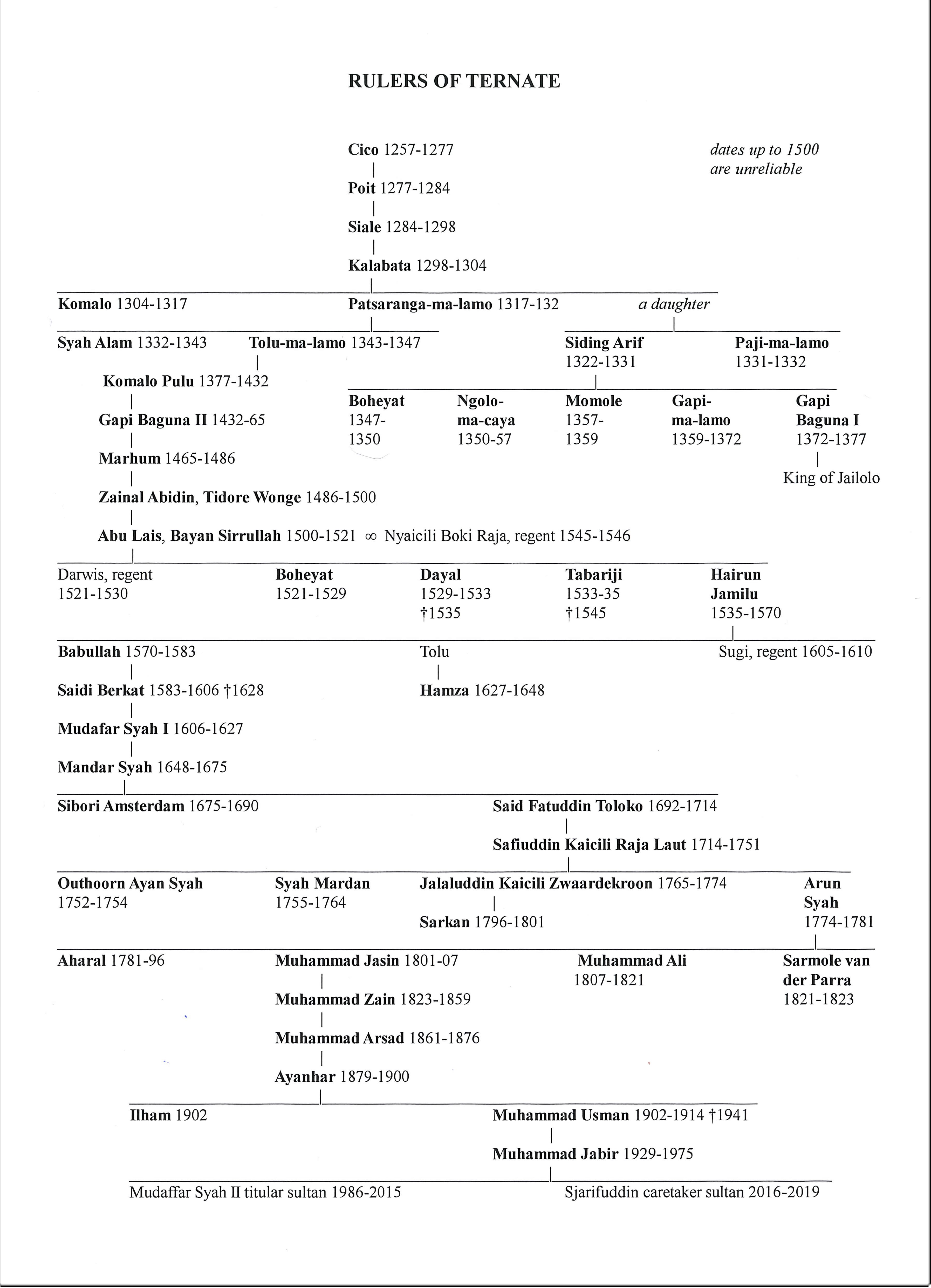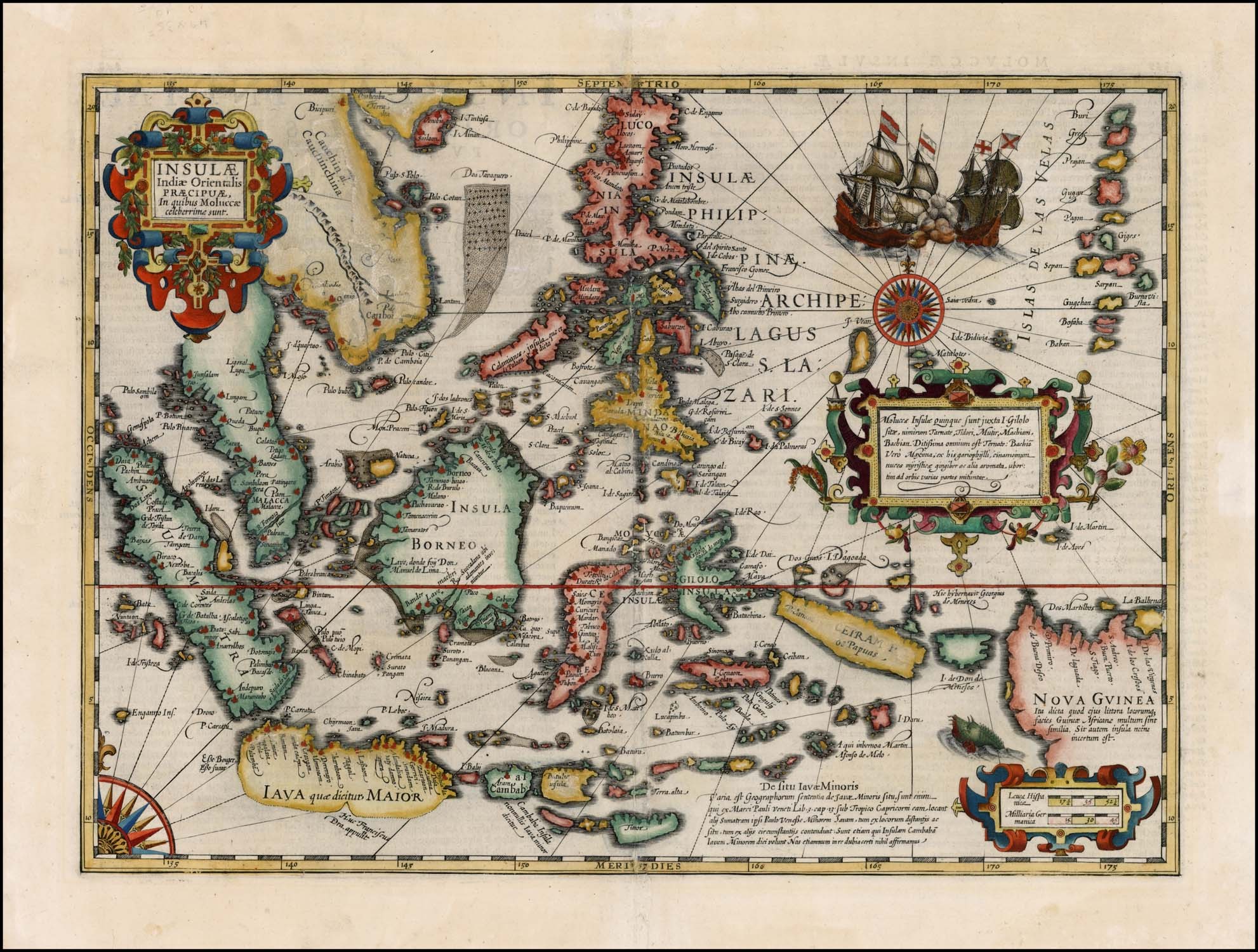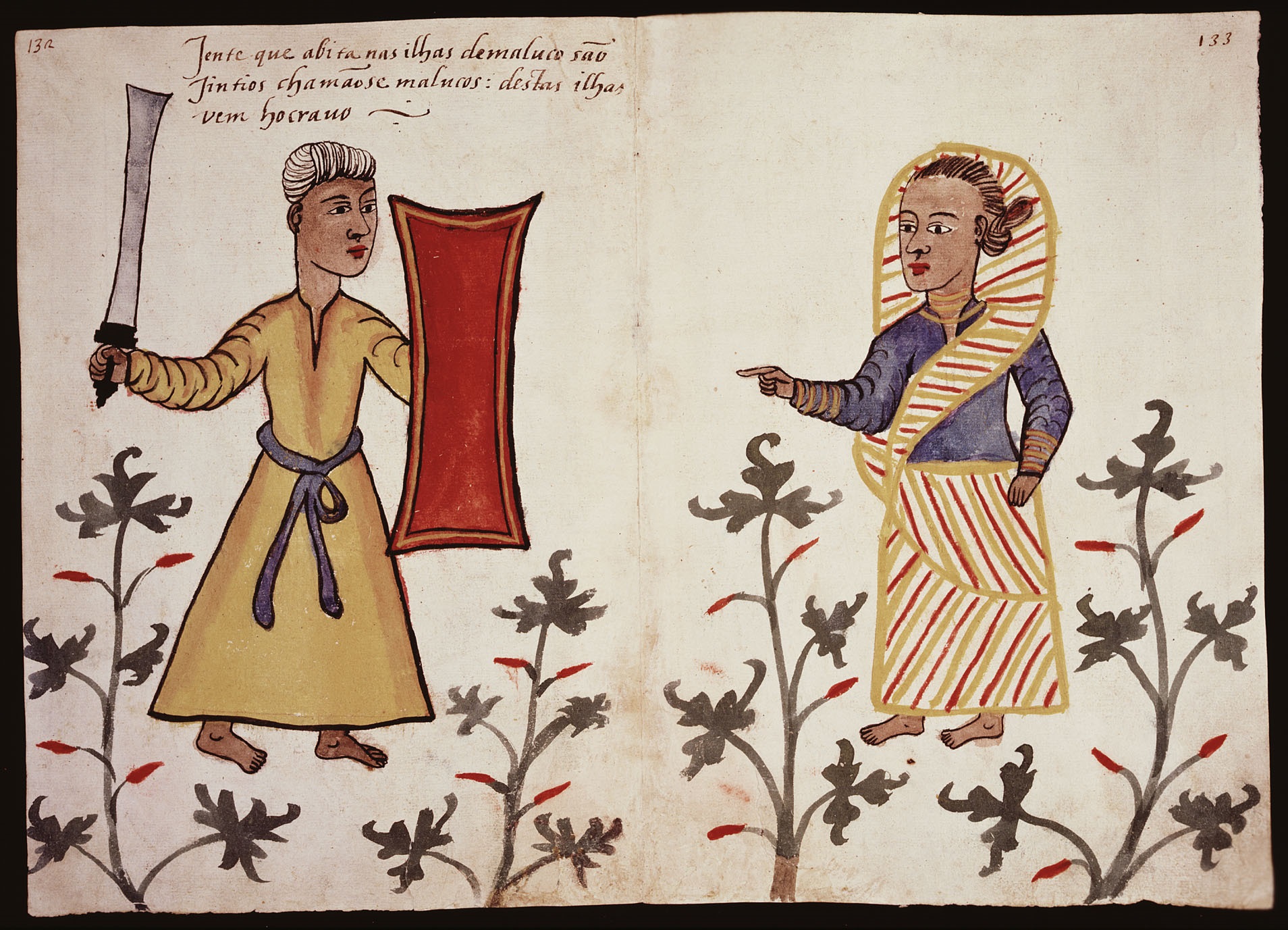|
Fort Tolukko
Fort Tolukko is a small fortification on the east coast of Ternate facing Halmahera. It was one of the colonial forts built to control the trade in clove spices, which prior to the eighteenth century were only found in the Maluku Islands. It has been variously occupied by the Portuguese, the native Ternate Sultanate, the Dutch, the British and the Spanish. It was abandoned as a fort in 1864, renovated in 1996, and is now a tourist attraction. Description Fort Tolukko is located in the village of Dufa Dufa on the edge of Ternate City on the island of Ternate, one of the Maluku Islands in modern Indonesia. It is a tall, stone built fort, sitting on a cape about above sea level. Fort Tolukko's unusual phallic layout is a function of the immediate topography. Its small narrow layout with two bulwarks is distinctively Iberian, different with the Dutch built Fort Oranje and Fort Kalamata. Its primary function was to dominate a rare coral reef-free landing point, directly in front of th ... [...More Info...] [...Related Items...] OR: [Wikipedia] [Google] [Baidu] |
Ternate
Ternate is a city in the Indonesian province of North Maluku and an island in the Maluku Islands. It was the ''de facto'' provincial capital of North Maluku before Sofifi on the nearby coast of Halmahera became the capital in 2010. It is off the west coast of Halmahera, and is composed of eight islands: Ternate, the biggest and main island of the city, and Moti, Hiri, Tifure, Mayau, Makka, Mano, and Gurida. In total, the city has a land area of 162.17 square kilometres and had a total population of 185,705 according to the 2010 census, and 205,001 according to the 2020 census, with a density of 1,264 people per square kilometre. It is the biggest and most densely populated city in the province, is the economic, cultural, and education center of North Maluku, and acts as a hub to neighbouring regions. It was the capital of the Sultanate of Ternate in the 15th and 16th centuries, and fought against the Sultanate of Tidore over control of the spice trade in the Moluccas before ... [...More Info...] [...Related Items...] OR: [Wikipedia] [Google] [Baidu] |
Francisco Serrão
Francisco Serrão (died 1521) was a Portuguese explorer and a possible cousin of Ferdinand Magellan. His 1512 voyage was the first known European sailing east past Malacca through modern Indonesia and the East Indies. He became a confidant of Sultan Bayan Sirrullah, the ruler of Ternate, becoming his personal advisor. He remained in Ternate where he died around the same time Magellan died. Voyage to the Indies Serrão served as captain of one of three vessels (and second in overall command under António de Abreu) sent from Malacca by Afonso de Albuquerque to find the Spice Islands of Banda in Maluku in 1511. Banda was the world's only source of nutmeg and mace, spices used as flavourings, medicines and preserving agents that were at the time highly valued in European markets. The Portuguese sought to dominate the source, rather than relying on Arab traders who sold it to the Venetians for exorbitant prices. Malay pilots guided the expedition east via Java and along the L ... [...More Info...] [...Related Items...] OR: [Wikipedia] [Google] [Baidu] |
Nuku Of Tidore
Nuku (born c. 1738 - died 14 November 1805) was the nineteenth Sultan of Tidore in Maluku Islands, reigning from 1797 to 1805. He is also known under the names Sultan Muhammad al-Mabus Amiruddin Syah, Saifuddin, Jou Barakati (Master of Fortune), and Kaicili Paparangan(Prince of Battles). He led a resistance against Dutch colonialism in Maluku and Papua from 1780 which was eventually successful. Being a leader with great charisma, he gathered discontents from several ethnic groups and strove to restore Maluku to its pre-colonial division into four autonomous kingdoms. Nuku used global political conflict lines by allying with the British against the French-affiliated Dutch and helped them conquer the Dutch stronghold in Ternate in 1801. In modern Indonesia he is commemorated as a '' pahlawan nasional'' (national hero). Background Prince Nuku was born around 1738 into one of the four branches of the royal family of Tidore. Not much is known of his early years, but his father beca ... [...More Info...] [...Related Items...] OR: [Wikipedia] [Google] [Baidu] |
Tidore Sultanate
The Sultanate of Tidore (Indonesian: كسلطانن تيدوري, ''Kesultanan Tidore'', sometimes ''Kerajaan Tidore'') was a sultanate in Southeast Asia, centered on Tidore in the Maluku Islands (presently in North Maluku Province). It was also known as Duko, its ruler carrying the title Kië ma-kolano (Ruler of the Mountain). Tidore was a rival of the Sultanate of Ternate for control of the spice trade, and had an important historical role as binding the archipelagic civilizations of Indonesia to the Papuan world. According to extant historical records, in particular the genealogies of the kings of Ternate and Tidore, the inaugural Tidorese king was Sahjati or Muhammad Naqil whose enthronement is dated 1081 in local tradition. However, the accuracy of the tradition that Tidore emerged as a polity as early as the 11th century is considered debatable. Islam was only made the official state religion in the late 15th century through the ninth King of Tidore, Sultan Jamaluddin. He wa ... [...More Info...] [...Related Items...] OR: [Wikipedia] [Google] [Baidu] |
Ternate Sultanate
The Sultanate of Ternate (Jawi alphabet: كسلطانن ترنتاي), previously also known as the Kingdom of Gapi is one of the oldest Muslim kingdoms in Indonesia besides Tidore, Jailolo, and Bacan. The Ternate kingdom was established by Momole Cico, the first leader of Ternate, with the title Baab Mashur Malamo, traditionally in 1257. It reached its Golden Age during the reign of Sultan Baabullah (1570–1583) and encompassed most of the eastern part of Indonesia and a part of southern Philippines. Ternate was a major producer of cloves and a regional power from the 15th to 17th centuries. The dynasty founded by Baab Mashur Malamo continues to the present, as does the Sultanate itself, although it no longer holds any political power. History Pre-colonial period The sultanate was originally named the Kingdom of Gapi, but later changed the name to be based on that of its capital, Ternate. Originally there were four villages in Ternate and led by clan leaders called Momol ... [...More Info...] [...Related Items...] OR: [Wikipedia] [Google] [Baidu] |
Mandar Syah
Sultan Mandar Syah (c. 1625—3 January 1675) was the 11th Sultan of Ternate who reigned from 1648 to 1675. Like his predecessors he was heavily dependent on the Dutch East India Company (VOC), and was forced to comply to Dutch demands to extirpate spice trees in his domains, ensuring Dutch monopoly of the profitable spice trade. During the Great Ambon War in the 1650s, Mandar Syah sided with the VOC but was nevertheless pushed to cede control over areas in Central Maluku. On the other hand, the Ternate-VOC alliance led to a large increase of Ternatan territory in the war with Makassar in 1667. Accession Kaicili (prince) Tahubo, the later Mandar Syah, was only a few years old when his father Sultan Mudafar Syah I passed away in 1627. He had two older brothers, Kaicili Kalamata and Kaicili Manilha, and was therefore not a likely candidate for the Ternatan throne. An older kinsman, Hamza ruled as Sultan from 1627 to 1648 when he passed away without sons. Now the grandees of the k ... [...More Info...] [...Related Items...] OR: [Wikipedia] [Google] [Baidu] |
Dutch East India Company
The United East India Company ( nl, Verenigde Oostindische Compagnie, the VOC) was a chartered company established on the 20th March 1602 by the States General of the Netherlands amalgamating existing companies into the first joint-stock company in the world, granting it a 21-year monopoly to carry out trade activities in Asia. Shares in the company could be bought by any resident of the United Provinces and then subsequently bought and sold in open-air secondary markets (one of which became the Amsterdam Stock Exchange). It is sometimes considered to have been the first multinational corporation. It was a powerful company, possessing quasi-governmental powers, including the ability to wage war, imprison and execute convicts, negotiate treaties, strike its own coins, and establish colonies. They are also known for their international slave trade. Statistically, the VOC eclipsed all of its rivals in the Asia trade. Between 1602 and 1796 the VOC sent almost a million Eur ... [...More Info...] [...Related Items...] OR: [Wikipedia] [Google] [Baidu] |
East Indies
The East Indies (or simply the Indies), is a term used in historical narratives of the Age of Discovery. The Indies refers to various lands in the East or the Eastern hemisphere, particularly the islands and mainlands found in and around the Indian Ocean by Portuguese explorers, soon after the Cape route was discovered. Nowadays, this term is broadly used to refer to the Malay Archipelago, which today comprises the Philippine Archipelago, Indonesian Archipelago, Malaysian Borneo, and New Guinea. Historically, the term was used in the Age of Discovery to refer to the coasts of the landmasses comprising the Indian subcontinent and the Indochinese Peninsula along with the Malay Archipelago. Overview During the era of European colonization, territories of the Spanish Empire in Asia were known as the Spanish East Indies for 333 years before the American conquest. Dutch occupied colonies in the area were known for about 300 years as the Dutch East Indies till ... [...More Info...] [...Related Items...] OR: [Wikipedia] [Google] [Baidu] |
Babullah Of Ternate
Sultan Babullah (10 February 1528 (?) – July 1583), also known as Sultan Baabullah (or Babu aabin European sources) was the 7th Sultan and 24th ruler of the Sultanate of Ternate in Maluku who ruled between 1570 and 1583. He is known as the greatest Sultan in Ternatan and Moluccan history, who defeated the Portuguese occupants in Ternate and led the Sultanate to a golden peak at the end of the 16th century. Sultan Babullah was commonly known as the ''Ruler of 72 (Inhabited) Islands'' in eastern Indonesia, including most of the Maluku Islands, Sangihe and parts of Sulawesi, with influences as far as Solor, East Sumbawa, Mindanao, and the Papuan Islands. His reign inaugurated a period of free trade in the spices and forest products that gave Maluku a significant role in Asian commerce. Youth He is traditionally said to have been born on February 10, 1528, though it might have been much later since his father Hairun is stated by Portuguese sources to have been born in c. 152 ... [...More Info...] [...Related Items...] OR: [Wikipedia] [Google] [Baidu] |
Hairun
Sultan Hairun Jamilu (c. 1522 – 28 February 1570) was the 6th Muslim ruler of Ternate in Maluku, reigning from 1535 to 1570. During his long reign, he had a shifting relation to the Portuguese who had a stronghold in Ternate and tried to dominate the spice trade in the region. This ended with his assassination at the hands of a Portuguese soldier in 1570. Early life Portuguese seafarers from Melaka had appeared in the waters of eastern Indonesia since 1512. The trade in spices and forest products made it vital for the early colonizers to secure bases in the Maluku Islands (Moluccas) and control the enormously lucrative commerce. A fort was built on Ternate in 1522–1523 with the approval of the local Sultan, who hoped for military assistance to expand his own power. At the time Ternate was the most powerful of the four sultanates of North Maluku, the other being Tidore, Bacan and Jailolo. However, the Portuguese captains soon began to dominate the royal court while the garrison ... [...More Info...] [...Related Items...] OR: [Wikipedia] [Google] [Baidu] |





%2C_Hoorn.jpg)


